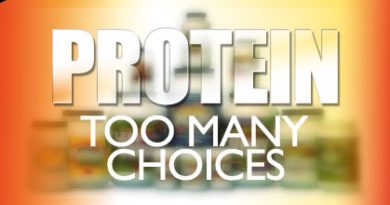Do You Know What’s in Your Quality Protein Powder?
When was the last time you thought about the protein powder you’re using? Is it really a quality protein powder?
You’re serious about your health and fitness. You track your workouts, you focus on your nutrition, and you invest in supplements to get the best results. But is that tub of protein powder on your counter really helping you reach your goals?
As a certified sports nutritionist with over two decades in the fitness industry, I’ve seen countless people sabotage their efforts by choosing the wrong fuel. If you’ve followed my work, you know I’m passionate about understanding the source of your nutrients. It’s simple: quality in, quality out.
The protein supplement market is massive, valued at over $28 billion in 2025 and growing. With so many options, it’s easy to grab a cheap, low-quality protein powder. But that’s a mistake that could be holding you back from real gains and better health.
This guide will break down what’s actually inside that scoop, helping you choose a high-quality protein powder that truly works for you.
Disclaimer: This article is for informational purposes only and is not meant to treat or diagnose any condition. It is recommended that you speak with your doctor before starting any exercise program, changing your daily nutrition, or adding any supplements to your regimen.
Table of contents
Key Takeaways
- Check for Third-Party Testing: Since the FDA doesn’t approve supplements before they hit the market, look for seals from NSF Certified for Sport or Informed-Choice. This ensures the product is free of banned substances and that the label is accurate.
- Know Your Protein Types: Whey Isolate (>90% protein) is fast-digesting and great for post-workout recovery. Whey Concentrate (70-80% protein) is a versatile, budget-friendly option. Casein is slow-digesting, making it ideal before bed.
- Read the Ingredient List: Avoid powders with unnecessary fillers like maltodextrin, thickeners like carrageenan, and artificial sweeteners. A shorter ingredient list is usually a sign of a higher quality protein powder.
- Match Protein to Your Goals: Active individuals should aim for 1.2 to 2.0 grams of protein per kilogram of body weight daily to support muscle repair and growth.

What is a Quality Protein Powder?
A quality protein powder is a dietary supplement that gives you a concentrated, convenient source of protein, an essential macronutrient for nearly every function in your body. While it’s popular with athletes, it’s really a tool for anyone looking to increase their protein intake to build and repair tissues, support a healthy immune system, and produce vital enzymes and hormones.
However, the supplement industry is not tightly regulated by the FDA, which means what’s on the label isn’t always what’s in the tub. This is where third-party testing becomes crucial. Certifications from organizations like NSF Certified for Sport or Informed-Choice verify that a product contains what it claims and is free from over 270 banned substances. For anyone serious about their health, especially competitive athletes, this is a non-negotiable mark of a quality protein powder.
Most high-quality powders are derived from a few key sources:
- Whey Protein: Sourced from milk during the cheesemaking process, whey is the most popular protein because it’s rapidly absorbed and contains all nine essential amino acids. This makes it perfect for post-workout recovery. It contains a high amount of the amino acid leucine, which is the primary trigger for muscle protein synthesis.
- Casein Protein: Also from milk, casein digests slowly, releasing amino acids over several hours. Many of my clients take it before bed to help prevent muscle breakdown and support recovery overnight.
- Plant-Based Proteins: Made from sources like peas, rice, soy, and hemp, these are excellent for vegans or those with dairy sensitivities. To ensure a complete amino acid profile, look for blends, such as pea and rice protein. Brands like Orgain and Garden of Life specialize in these high-quality blends.
- Egg White Protein: This is a great lactose-free option that provides a complete amino acid profile and is easily digested.
- Other Sources: You can also find protein powders made from beef, collagen, or even insects, though these are less common in the mainstream market.
You can mix a quality protein powder with water or milk or add it to smoothies, oatmeal, and even baked goods. While whole food should always be your primary source of nutrition, a protein supplement is an incredibly convenient way to meet your daily needs, especially when you’re active or on the go.
Before making any major dietary changes, it’s always smart to consult with a registered dietitian or healthcare professional.
Who Should Use a Quality Protein Powder?
A quality protein powder can be a powerful tool for a wide range of people, not just bodybuilders. If you have specific health and fitness goals, supplementing with protein can provide the targeted nutrition you need to succeed.
- Athletes and Active Individuals: If you’re engaged in regular strength training or endurance sports, your protein needs are higher. The American College of Sports Medicine recommends that active individuals consume between 1.2 to 2.0 grams of protein per kilogram of body weight daily. Protein powder helps repair muscle damage and speeds up recovery after intense workouts.
- Those Focused on Muscle Building: To build muscle, you need to be in a state of positive protein balance. A quality protein powder provides a concentrated, easily digestible source of amino acids, especially leucine, which signals your body to initiate muscle growth.
- Vegetarians and Vegans: It can sometimes be challenging to get enough complete protein from plant-based sources alone. A high-quality plant-based powder, like a pea and rice blend from Truvani, can easily fill any nutritional gaps.
- People with Busy Lifestyles: When you’re short on time, a protein shake is a quick and convenient meal or snack that prevents you from reaching for unhealthy options.
- Older Adults: Age-related muscle loss, or sarcopenia, is a serious health concern. Studies show that increased protein intake, combined with resistance training, can help older adults maintain crucial muscle mass and strength.
- Individuals Managing Weight: Protein increases satiety and helps regulate hunger hormones, making you feel fuller for longer. Including a protein shake can help you control your appetite and reduce overall calorie intake.
- Anyone Recovering from Injury or Surgery: Your body’s protein needs increase significantly during healing. The amino acids from protein are essential for repairing tissues and supporting immune function.
- Pregnant or Breastfeeding Women: Protein is vital for the baby’s growth and development, as well as for supporting milk production. A clean, third-party tested protein powder can be a safe way to meet these increased demands.
Not All Protein Powder is Created Equal… Looking for a Quality Protein Powder?
The supplement aisle is packed with options, and every label makes a big promise. But do you actually know what’s in your protein powder? Understanding the difference between the main types of protein is the first step in choosing a product that aligns with your goals and budget.
RELATED: The Best Protein Powder on Amazon
Are you using a concentrate, a caseinate, or an isolate? Do you know when to use each one for the best results? Let’s break down the details so you can make an informed choice and ensure you’re using a truly high-quality protein powder.
1. Protein Concentrate
Whey protein concentrate is the most common and budget-friendly type of protein powder. It undergoes less processing, leaving it with a protein content of around 70-80%. The remainder consists of carbohydrates and fats, including lactose.
Because of its versatility and moderate digestion speed, it’s a solid choice for daily use, whether in a smoothie or as a quick snack. However, if you are sensitive to lactose, the higher amount in concentrate might cause digestive discomfort. For a reliable option, many people start with a product like Optimum Nutrition’s Gold Standard 100% Whey, which is primarily a blend of concentrate and isolate.
2. Caseinate
Casein protein, often listed as calcium caseinate, is known for being extremely slow-digesting. When you drink it, it forms a gel-like substance in your stomach, leading to a sustained release of amino acids for up to seven hours. This makes it a fantastic choice for a meal replacement or, more commonly, as a shake before bed to fuel muscle repair while you sleep.
Pro-Tip: Never use casein for your post-workout shake. Its slow absorption rate means it can’t deliver amino acids to your muscles quickly enough when they need them most.
This slow breakdown also helps you feel full and satisfied, preventing late-night hunger. Optimum Nutrition’s Gold Standard 100% Casein is a widely used product in this category.
3. Protein Isolate
For post-workout recovery, whey protein isolate is the champion. It goes through an extra filtration process, called microfiltration, that removes most of the fat and lactose. The result is an incredibly pure powder that is over 90% protein by weight.
This purity means two things. First, it digests and absorbs very rapidly, rushing essential amino acids to your muscles to kickstart the recovery and rebuilding process. Second, with minimal lactose, it’s the best whey option for individuals with dairy sensitivities. A top-tier isolate like Dymatize ISO100 is a favorite among athletes for this reason.
If you want the absolute best, look for a grass fed whey protein isolate. It often has a superior micronutrient profile, providing more healthy fats and vitamins.
FAQs
How much protein do I really need each day?
For most healthy adults, the Recommended Dietary Allowance (RDA) is 0.8 grams of protein per kilogram of body weight. However, for active people and athletes, needs are much higher. The American College of Sports Medicine recommends 1.2 to 2.0 g/kg to support muscle recovery and growth.
When is the best time to take protein powder?
To maximize muscle growth, aim to consume 20-30 grams of high-quality protein within two hours after your workout. Using a fast-acting protein like whey isolate is ideal here. Beyond that, distributing your protein intake evenly across your meals throughout the day is key for maintaining muscle mass.
Will using protein powder make me bulky?
No, this is a common myth, especially among women. Protein powder is simply a concentrated food source. It supports muscle repair and growth, but gaining significant bulk requires a combination of intensive, specific weight training and a consistent calorie surplus. Using a quality protein powder will help you build lean, toned muscle, not unwanted bulk.
Can I use protein powder if I don’t work out?
Absolutely. Protein is essential for everyone, not just athletes. A quality protein powder can help you meet your daily protein needs, especially if you have a busy lifestyle, are trying to manage your weight by increasing satiety, or have higher protein requirements due to age or a medical condition.


*Disclosure: This article may contain affiliate links or ads, which means we earn a small commission at no extra cost to you if you make a purchase through these links. These commissions help support the operation and maintenance of our website, allowing us to continue producing free valuable content. Your support is genuinely appreciated, whether you choose to use our links or not. Thank you for being a part of our community and enjoying our content.
PLEASE CONSIDER SHARING THIS ON YOUR SOCIAL MEDIA TO HELP OTHERS LEARN MORE ABOUT THIS TOPIC.





